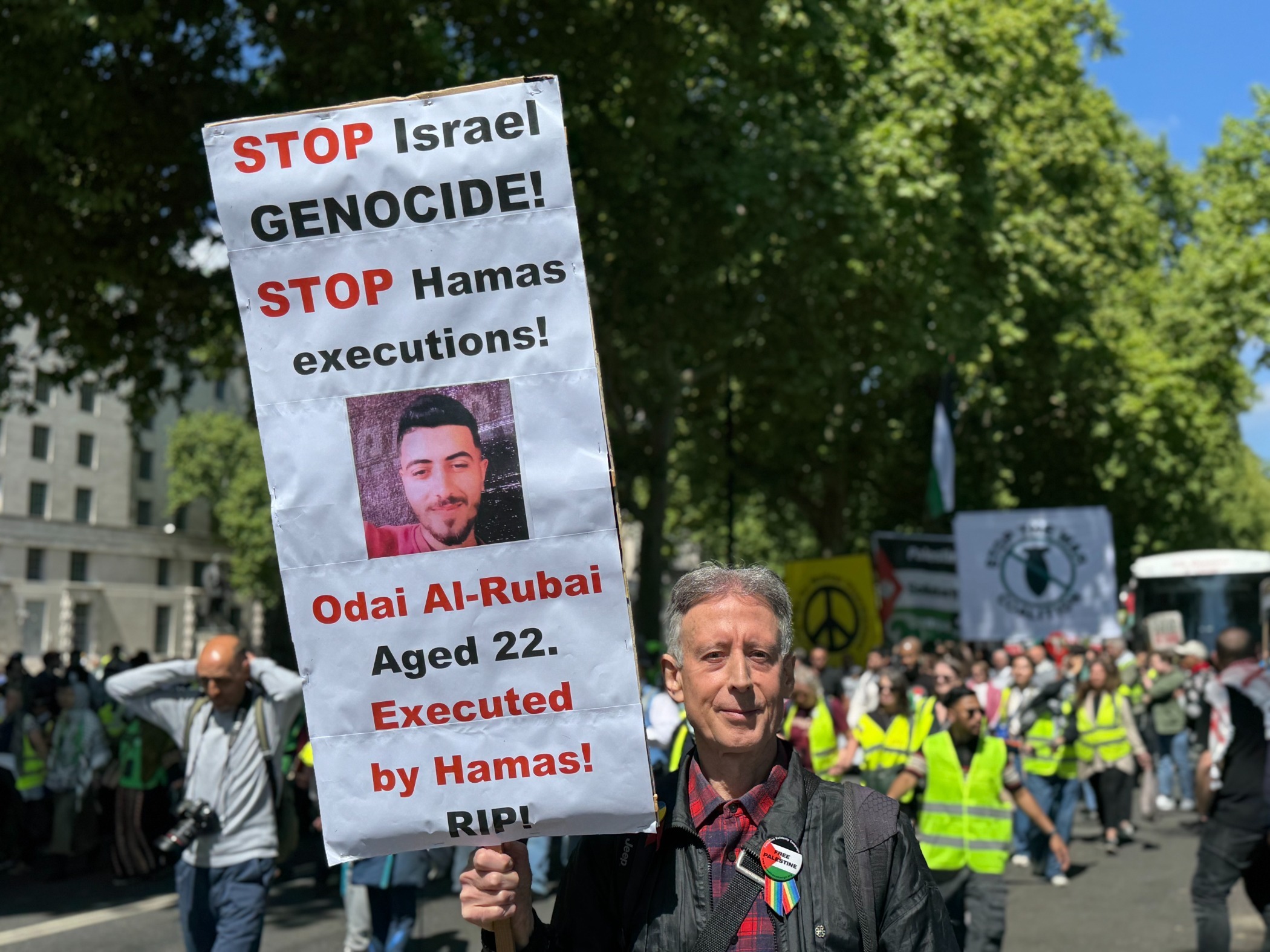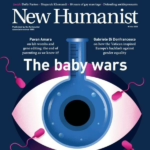We talk to the veteran human rights campaigner about free speech, Hamas, and Palestine Action

Peter Tatchell is a human rights and LGBT+ campaigner and director of the Peter Tatchell Foundation.
You’ve been campaigning for many decades. Can you tell us about your protest history?
My activism has been inspired by masters of change-making protest like Mohandas Gandhi and Martin Luther King. I’ve striven to adapt their methods of non-violent direct action and civil disobedience to my own campaigns.
I began campaigning in 1967 aged 15, when I was still at high school. During the last 58 years, I’ve participated in over 3,000 protests. In total, I have been arrested or detained by the police 103 times, in the UK and Russia, Qatar, India, France and communist East Germany. But I only have one standing conviction: for the OutRage! protest in Canterbury Cathedral on Easter Sunday 1998. It was against Dr George Carey, the then Archbishop of Canterbury, over his support for anti-LGBT+ laws.
I’m still campaigning at the age of 73 and I plan to carry on well into my 90s.
You have raised your voice against Israel’s war crimes, and also against the crimes of Hamas. Why is it important to speak up about both?
Human rights are universal and indivisible. Hamas is a sexist, homophobic and antisemitic religious extremist dictatorship. The human rights of both Palestinians and Israelis are important. That’s why I condemned the 7 October massacre and urged the release of Israeli hostages. I’ve also repeatedly condemned Israel’s occupation and its killing of Palestinian civilians in Gaza and the West Bank, while at the same time exposing and denouncing human rights abuses committed by Hamas. These abuses include the jailing, torture and execution of political dissidents and the suppression of trade unions, free speech, the right to protest and media freedom.
The Palestine solidarity movement loses credibility when it fails to condemn Hamas’s crimes. If we support Palestinians, we must oppose all their oppressors.
You were arrested on 17 May at a national Palestine solidarity protest in London. What happened?
The police claimed I had committed a racially and religiously aggravated breach of the peace by marching with my placard: “STOP Israel genocide! STOP Hamas executions! Odai Al-Rubai, aged 22, executed by Hamas! RIP!”
It was nonsense. My placard made no mention of anyone’s race or religion. The police also claimed that march stewards told them I shouted, “Hamas are terrorists.” I never shouted anything. And even if someone said those words, they have a right to do so under the laws protecting freedom of speech. Moreover, Hamas is a proscribed terrorist organisation. So why did the police tell me that shouting those words was a potentially arrestable offence?
I was detained on the pavement, in a police van and in cells at Charing Cross police station for a total of five hours and 38 minutes and I was denied the right to contact
a solicitor. The police have since said that they will take no further action and admitted I was arrested “in error”. I am taking legal action against the police over this abuse of power – not just for my own sake but for the sake of everyone wrongly arrested.
I support the Palestine Solidarity Campaign but it also has questions to answer. [PSC has said it is not aware of any of its stewards making a complaint to police.]
Rap duo Bob Vylan were widely condemned for shouting “Death, death to the IDF” at Glastonbury music festival. Is this legitimate free speech?
There is something seriously wrong when Bobby Vylan’s chanting of these five words provokes more outrage than Israel’s genocide, ethnic cleansing and its reduction of much of Gaza to a scene of flattened rubble reminiscent of Hiroshima after the atomic bomb.
Free speech includes the right to say offensive, and even appalling, things. But it does not include the right to make violent threats. “Death, death to the IDF” was a response to
the IDF’s murder of innocent Palestinian civilians – a war crime. If it had been a call to kill specific Israeli personnel, the charge of incitement to murder might be answerable
in court. But a generic call for death to the IDF probably would not. Besides, no one at Glastonbury is going to kill an Israeli soldier as a result of Vylan’s words. It was protest
rhetoric; not intended to be taken literally.
What about the proscription of Palestine Action, after activists broke into an RAF base and sprayed planes with red paint?
It is monstrous to equate Palestine Action with terrorist groups like al-Qaeda that have killed thousands of innocent civilians. If Palestine Action damaged property, they can be prosecuted for that crime. They’d go to prison for their beliefs and actions intended to expose UK complicity with Israel’s mass killing of civilians in Gaza, including more than 15,000 children [according to UNICEF]. Indeed, it is the British government who should be prosecuted for aiding and abetting Israel’s war crimes. Israel and the UK government are undermining international humanitarian law.
Why is it important to differentiate offensive speech from hate speech?
Nearly all ideas are capable of giving offence to someone. Many of the most important ideas in human history – such as those of Galileo Galilei, Karl Marx, Charles Darwin, Harriet Tubman and Sigmund Freud – caused great offence in their time. There are, in my view, normally only three legitimate grounds to restrict free speech. First, when someone makes false, damaging allegations – such as that a person is a rapist or tax fraudster. Second, when they engage in threats or harassment. And third, when they incite violence.
I am very wary of hate speech laws because what constitutes hate is hard to define. For example, in 2001, the preacher Harry Hammond staged a protest in Bournemouth town centre, displaying a sign saying, “Stop homosexuality”, saying it was sinful and that LGBTs should repent. But he was not aggressive and did not use inflammatory abusive language. He was charged under Section 5 of the Public Order Act 1986. Although I opposed his views and supported protests against him, I did not think he should have been prosecuted. I offered to testify in his defence on free speech grounds. But Harry was so homophobic that he refused my offer.
What do you make of the decision to prosecute Hamit Coskun after he burned the Koran outside the Turkish consulate in May?
Burning books has an ugly history associated with totalitarian regimes, but it should not be a crime. I was part of the humanist campaign that defied the blasphemy law on the steps of St Martin’s church in Trafalgar Square in 2002 and which successfully lobbied for the repeal of that law in England and Wales in 2008. The law gave religion, but no other institution, privileged protection against criticism. It restricted free speech. That is why it had to be scrapped.
Hamit Coskun was charged with using disorderly behaviour “within the hearing or sight of a person likely to be caused harassment, alarm or distress”, motivated by “hostility towards members of a religious group, namely followers of Islam”, contrary to the Crime and Disorder Act 1998 and the Public Order Act 1986. His conviction is an attack on the right to protest and freedom of expression. It is the de facto reintroduction of a blasphemy law by the back door.
We have to work to ensure that Coskun’s appeal succeeds. If it doesn’t, that would be a green light for many different religions to use public order legislation to repress critiques and satires of their faith.
This is a preview from New Humanist’s Autumn 2025 issue. Subscribe now.


